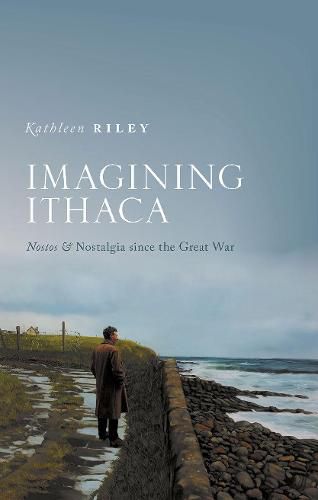Readings Newsletter
Become a Readings Member to make your shopping experience even easier.
Sign in or sign up for free!
You’re not far away from qualifying for FREE standard shipping within Australia
You’ve qualified for FREE standard shipping within Australia
The cart is loading…






‘Though home is a name, a word, it is a strong one’, said Charles Dickens, ‘stronger than magician ever spoke, or spirit answered to, in strongest conjuration.’ The ancient Greek word nostos, meaning homecoming or return, has a commensurate power and mystique. Irish philosopher-poet John Moriarty described it as ‘a teeming word… a haunted word… a word to conjure with’. The most celebrated and culturally enduring nostos is that of Homer’s Odysseus who spent ten years returning home after the fall of Troy. His journey back involved many obstacles, temptations, and fantastical adventures and even a katabasis, a rare descent by the living into the realm of the dead. All the while he was sustained and propelled by his memories of Ithaca (‘His native home deep imag’d in his soul’, as Pope’s translation has it). From Virgil’s Aeneid to James Joyce’s Ulysses, from MGM’s The Wizard of Oz to the Coen Brothers’ O Brother, Where Art Thou?, and from Derek Walcott’s Omeros to Margaret Atwood’s Penelopiad, the Odyssean paradigm of nostos and nostalgia has been continually summoned and reimagined by writers and filmmakers. At the same time, ‘Ithaca’ has proved to be an evocative and versatile abstraction. It is as much about possibility as it is about the past; it is a vision of Arcadia or a haunting, an object of longing, a repository of memory, ‘a sleep and a forgetting’. In essence it is about seeking what is absent.Imagining Ithaca explores the idea of nostos, and its attendant pain (algos), in an excitingly eclectic range of sources: from Rebecca West’s The Return of the Soldier and Remarque’s All Quiet on the Western Front, through the exilic memoirs of Nabokov and the time-travelling fantasies of Woody Allen, to Seamus Heaney’s Virgilian descent into the London Underground and Michael Portillo’s Telemachan railway journey to Salamanca. This kaleidoscopic exploration spans the end of the Great War, when the world at large was experiencing the complexities of homecoming, to the era of Brexit and COVID-19 which has put the notion of nostalgia firmly under the microscope.
$9.00 standard shipping within Australia
FREE standard shipping within Australia for orders over $100.00
Express & International shipping calculated at checkout
‘Though home is a name, a word, it is a strong one’, said Charles Dickens, ‘stronger than magician ever spoke, or spirit answered to, in strongest conjuration.’ The ancient Greek word nostos, meaning homecoming or return, has a commensurate power and mystique. Irish philosopher-poet John Moriarty described it as ‘a teeming word… a haunted word… a word to conjure with’. The most celebrated and culturally enduring nostos is that of Homer’s Odysseus who spent ten years returning home after the fall of Troy. His journey back involved many obstacles, temptations, and fantastical adventures and even a katabasis, a rare descent by the living into the realm of the dead. All the while he was sustained and propelled by his memories of Ithaca (‘His native home deep imag’d in his soul’, as Pope’s translation has it). From Virgil’s Aeneid to James Joyce’s Ulysses, from MGM’s The Wizard of Oz to the Coen Brothers’ O Brother, Where Art Thou?, and from Derek Walcott’s Omeros to Margaret Atwood’s Penelopiad, the Odyssean paradigm of nostos and nostalgia has been continually summoned and reimagined by writers and filmmakers. At the same time, ‘Ithaca’ has proved to be an evocative and versatile abstraction. It is as much about possibility as it is about the past; it is a vision of Arcadia or a haunting, an object of longing, a repository of memory, ‘a sleep and a forgetting’. In essence it is about seeking what is absent.Imagining Ithaca explores the idea of nostos, and its attendant pain (algos), in an excitingly eclectic range of sources: from Rebecca West’s The Return of the Soldier and Remarque’s All Quiet on the Western Front, through the exilic memoirs of Nabokov and the time-travelling fantasies of Woody Allen, to Seamus Heaney’s Virgilian descent into the London Underground and Michael Portillo’s Telemachan railway journey to Salamanca. This kaleidoscopic exploration spans the end of the Great War, when the world at large was experiencing the complexities of homecoming, to the era of Brexit and COVID-19 which has put the notion of nostalgia firmly under the microscope.